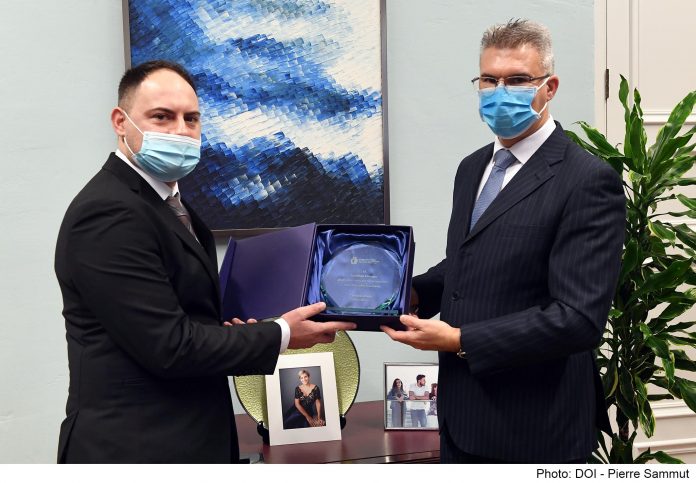Minister within the Office of the Prime Minister Carmelo Abela welcomed Jonathan Farrugia who produced, wrote, and directed the original production ‘Pass Pass għal Auschwitz’. Originally this production was broadcast on the national station and then exported abroad and in fact, won several international honours.
Spread over thirteen episodes, this production which was broadcast on the national station between April and June 2019, recounts the direct and moving experiences of those who managed to survive the atrocities committed by the German Nazi between 1933 and 1945 in the Auschwitz concentration camp in Poland. The series begins with the rise of the Nazis to power in Germany and concludes with the liberation of the camp.
The documentary was shot in England as well as Poland and prisoners from the camp who are now writing their stories in a book were interviewed, together with Professors from the University of London who specialize in the history of the Holocaust. More prisoners from the camp, children of prisoners and people living in ghettos were interviewed in Poland. The production even met with a prisoner who showed them the camp and where he was placed in it. Apart from Mr Farrugia’s work, Mr Dixon Vella carried out research and filming while the presentation and interviews were in the hands of the veteran broadcaster Joe Dimech.
Internationally, parts of the series were shortened into a 32-minute documentary and translated to English, except for small parts that were left in Maltese for international audiences to listen to the Maltese language while understanding through subtitles. This Maltese production won three awards and an honourable mention while being a finalist in three other competitions. One of the judges in these competitions said that this documentary should be followed not as a product but as a lesson for humanity.
During his meeting with Minister Abela, Mr Farrugia explained that this history will be lost forever if there are no more such documentaries as these people are dying due to their age. He also explained the filming process as well as the choice of the Maltese language being introduced to international audiences.
Minister Abela, who is responsible for public service broadcasting, insisted how productions that go beyond our shores expose the projects of Maltese producers to more advanced skills than those they are accustomed to, while he inspired local competitors to reach that level themselves. Thus, the quality of the Maltese audio-visual product continues to improve.
The minister explained that the government is promoting the importance of creativity from a cinematographic and digital point of view, through numerous schemes to help expand this industry in Malta.










